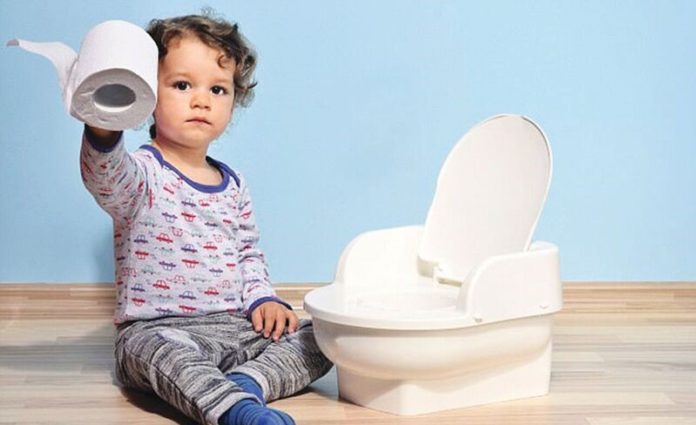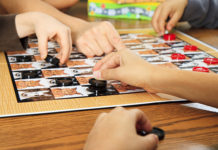“Dr. Lightman, my 2 ½-year-old is going to be in diapers forever. How will this kid ever move on in life?”
Ah, to have the proverbial nickel for every time I’ve heard that one.
Please know, Mom and Dad, that your toddler will be toilet trained. It might not be today, tomorrow or even next week. But please know that he will not go to Little League in diapers. And she’s not going to seminary that way either. But it sure feels like a long road to get there.
Few parents are prepared for how long toilet training can take. Some kids are trained over a weekend. Others can take several months. There’s a better chance of success if a parent understands some of the important elements of toilet training in advance.
The first step in successfully toilet training a toddler is that he needs to be able to sense the urge to go, be able to understand what the feeling means, and then be able to verbalize that he needs your help to make it to the toilet and actually go.
Some signs of readiness to watch for:
- Can he follow simple instructions?
- Can he walk and sit down?
- Can he take off his pants and put them back on?
In addition, you must consider the other challenges your toddler child is dealing with at the moment. Is there a new school? Caregiver? Sibling? These are likely to cause some snags in the process. No matter what, try not to pressure him. Otherwise, it’s all counterproductive.
Most children are ready between 24-27 months, but there are many variations. Don’t get hung up just because your child is a certain age and they’re not following the handbook on toilet training that you want them to. Waiting until your child is truly ready will make the experience much faster and more pleasant for everyone involved.
It’s highly unlikely that your child is going to become toilet trained through one prepackaged, one-size-fits-all method only. Google and you’ll find all kinds of methods. Most likely, whatever method you choose, you will abandon. This may happen more than once. That’s okay. And then you’ll make up the method for your child. And it will work. The most important thing is ascertaining your child’s readiness. Otherwise, it becomes an exercise in futility.
Also keep in mind that what has worked for one child in a family doesn’t necessarily work for another child in the same family. Each child is an individual and the process must be approached accordingly.
These universal rules relating to toilet training – as well as to other aspects of parenting – will enhance your family’s experience no matter what method you choose.
Be positive. Children learn better when they are praised for their progress rather than punished for their mistakes. Do what you can to help your child succeed as often as possible – even if it means learning gradually, one tiny step at a time. When he progresses, give him a hug, some praise, and perhaps even a small tangible reward. When he fails, tell him you’re sure he’ll do better next time and ask him to help you clean up.
Part of being positive is creating motivation called bribes. Yes, you read this correctly. And mini M&Ms can do the trick. One idea: 3 Minis for using the potty correctly. Add 3 for wiping.
Be consistent. Create reasonable expectations according to your child’s abilities, express them clearly and frequently, and expect your child to at least try to follow them every time. Keep his bathroom routine as consistent as possible, with the potty in the same place every day and the sequence of actions – including wiping and hand washing— the same every time. While he is toilet training, praise him for each success, and provide predictable, non-punitive consequences (such as helping to clean up) for each failure. Make sure that your approach to toilet training is consistent with those of your child’s other caregivers as well.
Stay involved and observe. Very young children’s needs, behaviors, and abilities change frequently and, not surprisingly, unpredictably. Toilet training approaches that worked two weeks ago may not work today, and skills that your child mastered in the past may temporarily disappear in the face of new challenges. Continue to monitor your child’s bathroom behavior throughout toilet training and afterward so that you can quickly identify and resolve any new problems that arise.
Face the fears. Some kids are frightened to use the toilet. Please don’t poo-poo (no pun intended) their fears. Each child is wired differently. A more analytical child may see #2 as part of themselves so when flushing the toilet…well, you connect the dots. Tell him that his poop is going to join the entire family’s poop. That comforts a child. Parents must get to know their children and help them to move past whatever fears they may have in a nonjudgmental environment.
Enjoy. Toilet training is a necessary chore, but it can also be fun at times. Don’t take your child’s hesitations, passing fears, or resistance too seriously. Nearly every child learns to use the toilet sooner or later, and your child will, too. Do what you can to occasionally take your eye off the long-term goal and enjoy the charming, funny moments along the way. Keep a notebook of what your child says. They can be hysterically funny and, unless recorded, their thoughts can go “down the toilet.” You’ll want to remember what they say.
Still not having progress in this area?
Don’t force the issue as often, the child may withhold his stool. This can be problematic and cause distension of the bowels, something you don’t want to happen. He will have stomach aches. He might go into a corner, bend forwards and squeeze his tush, pushing the stool back up. Sometimes, especially when successfully trained for urination, he may want only to defecate in a diaper. That’s okay.
A chat with your pediatrician can be helpful.
There’s good news in this whole process. Yes, a toilet trained child is a great milestone to achieve. But even bigger, you and your child will get to know one another much better through this process. In addition, your child will have learned a new skill in a way that has increased his confidence, sense of security, and self-esteem. Wow. What a great basis for developing further.
As always, daven.







